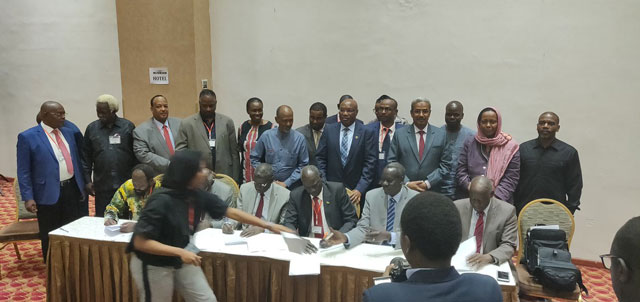
South Sudan rivals agree to delay forming unity government
Addis Ababa, Ethiopia | AFP | South Sudan’s warring parties agreed Friday to delay by six months the formation of a power-sharing government just days before it was due to be installed in the capital Juba.
Representatives for President Salva Kiir and his rival, rebel leader Riek Machar, gathered in Ethiopia in a bid to salvage a 2018 peace deal to end years of war in the world’s youngest country.
The parties had failed to resolve several crunch issues as the May 12 deadline loomed for creating a unity government with Machar as vice president.
His camp wanted a six-month delay to resolve security and other issues that, it says, prevent him from making his return from exile to Juba, which he fled in 2016 when a prior peace agreement collapsed.
The government wanted the meeting to focus on forming a joint administration in Juba.
Observers had warned that reuniting the arch-rivals in government for a third time without resolving these issues could be a recipe for further disaster.
But both parties agreed to push back the deadline at the talks in Addis Ababa hosted by the Intergovernmental Authority on Development (IGAD), a regional bloc for East Africa.
“The Parties identified lack of political will, financing and time constraints as the major challenges that have delayed implementation of the Pre-Transitional tasks,” IGAD said in a statement.
IGAD’s South Sudan special envoy, Ismael Wais, said both parties had avoided a crisis by agreeing to iron out the unresolved aspects of the deal rather than pushing ahead too early.
“Everybody is asking the question what comes next. Would there be problem if the implementation of the agreement a failure, have we failed already,” he said.
“Now, this meeting proved all the South Sudan parties are committed to the peace agreement.”
– Unfinished business –
Crucial steps envisioned in the deal, such as establishing a unified army and discussing security control of the capital, had yet to take place.
Officials had said that of 59 key tasks to be implemented before the May 12 deadline, only 27 had been completed.
Of the others, 17 were ongoing and 15 were pending, meaning that they had yet to be broached.
“We came out (of talks) with the conclusion that some of the provisions have not yet been implemented, others are ongoing and others have been accomplished,” said Michael Makuei, South Sudan’s Minister of Information.
“On the permanent ceasefire and transitional security transitional arrangement, we lag behind.”
South Sudan’s war broke out two years after independence in 2011, after Kiir accused his Machar, his former vice president, of plotting a coup against him.
The fighting has killed around 380,000 people and forced more than four million South Sudanese — almost a third of the population — to flee their homes.
“Today’s decision to extend the pre-transitional period averts any thinking that we will revert to turmoil,” said Henry Dawar, deputy chairman of Machar’s SPLM-IO party.
“This time around the peace is going to be implemented and it’s going to be a lasting peace.”
While the latest peace deal largely stopped fighting, violence has continued in some regions with rebel groups who did not sign up to it.
FULL STATEMENT
RTGOnu South Sudan by The Independent Magazine on Scribd
 The Independent Uganda: You get the Truth we Pay the Price
The Independent Uganda: You get the Truth we Pay the Price





